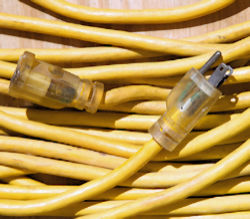Assured Equipment Grounding Conductor Program (AEGCP)
The AEGCP covers all cord sets, receptacles that are not a part of the permanent wiring of the building or structure, and equipment connected by cord and plug that are available for use or used by employees.

OSHA requires a written description of the employer's AEGCP, including the specific procedures adopted, be kept at the job site. This program should outline the employer's specific procedures for the required equipment inspections, tests, and test schedule.
The required tests must be recorded, and the record maintained until replaced by a more current record. The written program description and the recorded tests must be made available, at the job site, to OSHA and any affected employee upon request. The employer is required to designate one or more competent persons to implement the program.
Electrical equipment noted in the AEGCP must be visually inspected for damage or defects before each day's use. The employee must not use any damaged or defective equipment until it is repaired.
OSHA requires two tests:
- Continuity Test: The continuity test ensures that the equipment grounding conductor is electrically continuous. Perform this test on all cord sets, receptacles that are not part of a building or structure's permanent wiring, and cord- and plug-connected equipment required to be grounded. This test can be accomplished with various test equipment.
- Terminal Connection Test: The terminal connection test ensures that the equipment grounding conductor is connected to its proper terminal at receptacles and cord plugs. Perform this test with the same equipment used in the first test, or for receptacles use receptacle testers.
Knowledge Check Choose the best answer for the question.
2-11. Which test is required by OSHA in the Assured Equipment Grounding Conductor Program (AEGCP)?
You forgot to answer the question!
